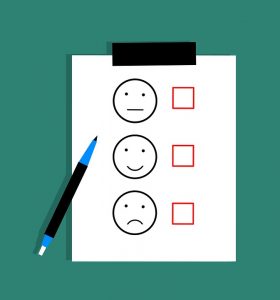Assessments of learning:
 |
FunDay Monday assignments (5%): One key goal of the course is to help you develop into sharper researchers and more critical consumers of research. Details about these assignment will be posted on Canvas and are due at the beginning of class on Oct 13 and Nov 22. |
 |
Midterms (2 x 11%): There will be two non-cumulative midterms: on Oct 4 (Ch. 1, 2, 4, 8, 9, 7 [Intro to Finalizing questionnaire]) and Nov 8 (Ch. 3, 5, 10-12) |

|
Peer Evaluations Completion (2 x 1%): To encourage everyone to contribute to the group project, all of you will be able to evaluate each other and have it count towards your grades. Merely completing a set of evaluations will give you 1%. The first will be due on Oct 20, and the second will be due on Dec 10. |
 |
Lab component (35%): A lab component is integrated into the course to facilitate a collaborative group project. There will be 5 lab sessions during which you will meet with your group, guided by your assigned Teaching Fellow. All labs are mandatory. You will have a lower lab component grade if you miss any of the labs. Please check Canvas for all lab manual modules for this lab component.
Over the course of these sessions, you and your group will come up with, and empirically test, a hypothesis. At the end of the year, your group will present the results at a poster session attended by other faculty and university administrators. Your lab component grade breaks down as follows:
|
 |
Research Experience (5%): Given the research-focused nature of this course, we ask that you participate in 4 hours of studies from the Human Subject Pool (HSP) at the Department of Psychology. You can access studies at: https://ubc-psych.sona-systems.com/. You need an active HSP account for this; if you do not have one, the website will tell you how. More information about the HSP can be found at https://psych.ubc.ca/undergraduate/opportunities/human-subject-pool/. You also obtain 1% for completing the Tri-Council Policy Statement (TCPS) ethics tutorial – mandatory for anyone involved in research that uses human subjects (including yours). You can access the tutorial here: http://tcps2core.ca/welcome Instead of HSP studies, Students may write 500-word summaries of empirical articles from the journal Psychological Science (published after 2000). Each summary counts for 1%, and should include the introduction, methods, results, and discussion sections of the article. If you opt to write these summaries instead, you must still create an HSP account and register it under our course section. You must submit a copy of your summaries to Turnitin (ID and password information can be found here) by the last day of classes |
 |
Final (30%): The final exam will be cumulative of all materials covered throughout the term. The date, time, and location of your final exam will be determined by the Office of the Registrar. Please check the Student Services Centre website for more details once the exam schedule has been released |
 |
Early Alert (1%): Students who are in need of help (counselling, financial, housing, etc.) may not seek the necessary services for help for various reasons, including lacking knowledge of appropriate services. This UBC initiative provides aid to these students as early as possible by allowing me to better connect such students to the relevant resources. Students can, thus, get the support they need before problems become too onerous. As a supporter of this initiative, I ask that you watch the brief video about it on the course’s Canvas website by Oct 6, and put down your name to acknowledge that you have read it (which will give you the 1%). This means neither that you support this initiative, nor that you intend to use it, only that you have read it and understood what it is. If you have any questions or concerns, please do not hesitate to talk to me |
*All written work for this course MUST be written independently. UBC subscribes to the Turn-It-In system, which compares submitted work to other sources on its database (including work submitted by your peers) to check for potential plagiarism – which includes either copying someone else’s work or reusing your own work without my permission. Plagiarism is a serious offense, and shall also be dealt with seriously. All written work must be submitted to Turn-It-In at http://www.turnitin.com. If you do not already have an account, please sign up for one, join your TF’s section using their ID on the main page, and the password (research217), and then submit your work when the time comes
All images on this page have been licensed under CC0 Creative Commmons license.